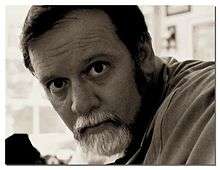Bruce Webster
Bruce F. Webster is an American academic and software engineer. He is currently a principal at Bruce F. Webster & Associates and an adjunct professor in computer science at Brigham Young University.

Early life and education
Webster studied computer science at Brigham Young University in 1978, graduating in 1978. He had received a full National Merit Scholarship for his studies.[1] He went on to do graduate work in computer science at the University of Houston-Clear Lake.[2]
Career
Webster, since 1980, has written over 150 articles on the computer industry and software development. He has also written four books on information technology (IT) issues, including The NeXT book, Pitfalls of Object-Oriented Development, and Object-Oriented Programming for Dummies, while contributing to two others. He authored PricewaterhouseCoopers' 2000 white paper, Patterns in IT Litigation: System Failure. He also wrote for two years as an IT management columnist for Baseline.[2]
Webster has been invited to speak at conferences internationally, has appeared on TV news broadcasts, and been cited in publications including Newsweek, The Wall Street Journal, and Barron's. He has testified before Congress on three occasions, and has been consulted in several legal cases in the United States and abroad. He has been an arbitrator and a neutral expert in litigation relating to IT and has testified as an IT expert in federal and state court.
Webster is an internationally-recognized expert on information technology, having been an invited speaker at conferences in the US, Japan, Russia, Central America, and the Middle East. He has likewise appeared on TV news broadcasts and been cited in publications such as Newsweek, the Wall Street Journal, and Barron’s. He has testified three separate times before Congress.
Personal life
Webster currently resides in Provo, Utah, with his wife Sandra.[2] He has been a member of The Church of Jesus Christ of Latter-day Saints since 1967 and has played an active role in the church.[1]
Webster is a 1978 graduate of Brigham Young University with a bachelor's degree in computer science. He also did graduate work in computer science at the University of Houston–Clear Lake in southeast Houston, Texas.
Webster performed the co-design and programming of the original Apple II version of the computer game SunDog: Frozen Legacy for FTL Games.[3] The game was somewhat of a success and is still recognized today as one of the landmark games for early home computers.
Webster went on to write for BYTE and Macworld and taught computer science at his alma mater of Brigham Young University. He later went on to help found another software startup (Pages Software Inc.), where he served as Chief Technical Officer and chief software architect for five years. Webster is teaching at BYU once again, instructing senior-level software engineering courses.
Webster is the author of several books regarding programming and the programming process.[4] He runs Bruce F. Webster & Associates LLC, a company which "provides expert analysis in matters involving information technology, with a focus on system development, project failure, intellectual property, web and internet technologies, and software engineering." (ibid)
One of Webster's current projects is the SunDog Resurrection project, an open-source rewrite of his early game. His original plan was to implement it in Java, but it has since been started in Python without his involvement.[5]
References
- "About Bruce F. Webster". Adventures in Mormonism. Retrieved November 26, 2017.
- "About Bruce F. Webster". brucefwebster.com. Retrieved November 26, 2017.
- Neal Roger Tringham (2014). Science Fiction Video Games. CRC Press. p. 414. ISBN 978-1-482-20388-2.
- Webster's background from his personal website
- SunDog: Bruce F. Webster from Webster's website